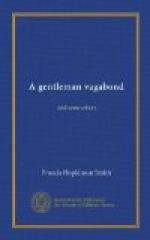“‘The hand of a soldier is never refused the world over,’ and I shook it warmly. As it dropped to his side I caught sight of his seal-ring.
“‘Pardon me one moment. Give me your hand again.’ The ring bore the crest and motto of the countess.
“’It is enough, colonel. Your sister showed me her own on the train. Pardon my suspicions. What can I do for you?’ He looked puzzled, hardly grasping my meaning.
“‘Nothing. You have told me all I wanted to know.’
“‘But you will breakfast with me before I take the train?’ I said.
“’No; that might get you into trouble—serious trouble, if I should be arrested. On the contrary, I must insist that you remain in this room until I leave the building.’
“‘But you perhaps need money; these disguises are expensive,’ glancing at his perfect appointment.
“’You are right. Perhaps twenty rubles—it will be enough. Give me your address in Berlin. If I am taken, you will lose your money. If I escape, it will be returned.’
“I shook his hand, and the door closed. A week later a man wrapped in a cloak called at my lodgings and handed me an envelope. There was no address and no message, only twenty rubles.”
* * * * *
I looked out over the sea wrinkling below me like a great sheet of gray satin. The huge life-boat swung above our heads, standing out in strong relief against the sky. After a long pause,—the story had strangely thrilled me,—I asked:—
“Pardon me, have you ever seen or heard of the countess since?”
“Never.”
“Nor her brother?”
“Nor her brother.”
“And the locket?”
“It is here where she placed it.”
At this instant the moon rolled out from behind a cloud, and shone full on his face. He drew out his watch-chain, touched it with his thumb-nail, and placed the trinket in my hand. It was such as a child might wear, an enameled thread encircling it. Through the glass I could see the tiny nest of jet-black hair.
For some moments neither of us spoke. At last, with my heart aglow, my whole nature profoundly stirred by the unconscious nobility of the man, I said:—
“My friend, do you know why she bound the bracelet to your wrist?”
“No; that always puzzled me. I have often wondered.”
“She bound the bracelet to your wrist, as of old a maid would have wound her scarf about the shield of her victorious knight, as the queen would pin the iron cross to the breast of a hero. You were the first gentleman she had ever known in her life.”
JOHN SANDERS, LABORER
[The outlines of this story were given me by my friend Augustus Thomas, whose plays are but an index to the tenderness of his own nature.]




